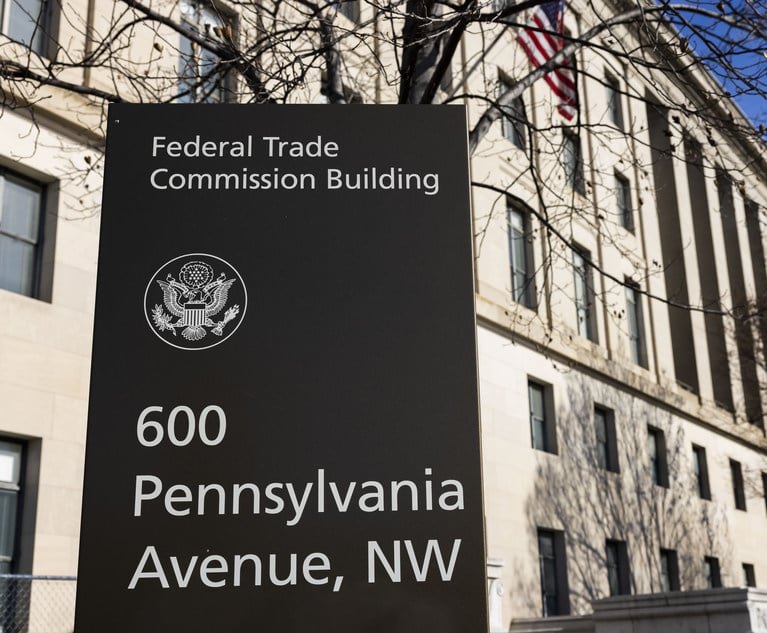Tennessee Bans Deceptive Lawyer Ads About Medicines, Medical Devices
Tennessee last week became the first state in the nation to enact a law to stop deceptive trial lawyer ads targeting prescription drugs and medical devices with some companies and their in-house counsel supporting the law.
April 12, 2019 at 04:47 PM
4 minute read
The original version of this story was published on Corporate Counsel
 Nathan Morris, vice president of legislative affairs for the U.S. Chamber Institute for Legal Reform. Photo by Ian Wagreich.
Nathan Morris, vice president of legislative affairs for the U.S. Chamber Institute for Legal Reform. Photo by Ian Wagreich.
The U.S. Chamber Institute for Legal Reform is calling on other states to follow the lead of Tennessee, which last week became the first state in the nation to enact a law to stop deceptive trial lawyer ads targeting prescription drugs and medical devices.
The ads run mostly on television and the internet. Many use warning signs and graphic video of ambulances while flashing “Medical Alert” or “Recall Warning” on the screen. Some even use the logos of government agencies.
Harold Kim, chief operating office of the institute, said in a blog that the ads are part of an aggressive marketing plan by plaintiffs attorneys to lure consumers into filing or joining lawsuits against the companies that make the drugs or devices. Kim was traveling and unavailable for comment Friday.
In-house counsel Nathan Morris, the chamber's vice president for legislative affairs, told Corporate Counsel that the ads “scare people out of taking their medicines and the results can be tragic.”
Morris cited research by both the chamber and the U.S. Food and Drug Administration that shows the ads lead to many consumers stopping their needed medications. People have been harmed by that, he said, and “in at least six cases, people who stopped their medications died.”
The Tennessee law, which takes effect in July, doesn't completely outlaw the ads, but it does seek to curb them by prohibiting any deception. It bans ads that display the logo of a government agency, use the word “recall” if a product hasn't been recalled, or fail to disclose they are paid advertisements for lawyers. An ad also must not present itself as a “medical alert,” “health alert,” “consumer alert,” “public service announcement,” or use other similar language, according to the law.
It also requires the ad to include the warning: “Do not stop taking a prescribed medication without first consulting with your doctor. Discontinuing a prescribed medication without your doctor's advice can result in injury or death.”
Unless the product was recalled, the advertiser also must disclose that the drug or medical device remains approved by the FDA. Any violation of the law will be considered a violation of the Tennessee Consumer Protection Act.
Morris called the law “a win for consumers and for companies that produce much-needed medications and devices that save lives.”
He said the statute had the support of several groups, including physicians, patient advocates, and companies and their general counsel.
Morris said the Texas Senate has passed a similar bill and sent it to the Texas House, where a companion bill was introduced. “Other states should definitely follow Tennessee's lead,” he said.
Laurie Speed, the president of the Georgia Trial Lawyers Association, issued this statement on the issue: “As plaintiff's attorneys, we are first and foremost concerned with the protection of the consumer. Whether in the form of pharmaceutical companies boasting the wonders of their product or from law firms misleading potential clients in any way, false advertising only serves to harm the consumer, thus breaching the inherent trust they expect with providers.”
Jonathan Ringel of the Daily Report contributed to this version of this article, which first ran in Corporate Counsel.
This content has been archived. It is available through our partners, LexisNexis® and Bloomberg Law.
To view this content, please continue to their sites.
Not a Lexis Subscriber?
Subscribe Now
Not a Bloomberg Law Subscriber?
Subscribe Now
NOT FOR REPRINT
© 2025 ALM Global, LLC, All Rights Reserved. Request academic re-use from www.copyright.com. All other uses, submit a request to [email protected]. For more information visit Asset & Logo Licensing.
You Might Like
View All
Law Firm Sued for Telemarketing Calls to Customers on Do Not Call Registry

FTC, For-Profit Online Education Group Reach $43.5M Agreement After Consumer Protection Suit Filed Monday

Herschel Walker's 2022 Campaign for Senate Sues Media Agency for Inflated Ad Costs

Trending Stories
- 1Uber Files RICO Suit Against Plaintiff-Side Firms Alleging Fraudulent Injury Claims
- 2The Law Firm Disrupted: Scrutinizing the Elephant More Than the Mouse
- 3Inherent Diminished Value Damages Unavailable to 3rd-Party Claimants, Court Says
- 4Pa. Defense Firm Sued by Client Over Ex-Eagles Player's $43.5M Med Mal Win
- 5Losses Mount at Morris Manning, but Departing Ex-Chair Stays Bullish About His Old Firm's Future
Who Got The Work
J. Brugh Lower of Gibbons has entered an appearance for industrial equipment supplier Devco Corporation in a pending trademark infringement lawsuit. The suit, accusing the defendant of selling knock-off Graco products, was filed Dec. 18 in New Jersey District Court by Rivkin Radler on behalf of Graco Inc. and Graco Minnesota. The case, assigned to U.S. District Judge Zahid N. Quraishi, is 3:24-cv-11294, Graco Inc. et al v. Devco Corporation.
Who Got The Work
Rebecca Maller-Stein and Kent A. Yalowitz of Arnold & Porter Kaye Scholer have entered their appearances for Hanaco Venture Capital and its executives, Lior Prosor and David Frankel, in a pending securities lawsuit. The action, filed on Dec. 24 in New York Southern District Court by Zell, Aron & Co. on behalf of Goldeneye Advisors, accuses the defendants of negligently and fraudulently managing the plaintiff's $1 million investment. The case, assigned to U.S. District Judge Vernon S. Broderick, is 1:24-cv-09918, Goldeneye Advisors, LLC v. Hanaco Venture Capital, Ltd. et al.
Who Got The Work
Attorneys from A&O Shearman has stepped in as defense counsel for Toronto-Dominion Bank and other defendants in a pending securities class action. The suit, filed Dec. 11 in New York Southern District Court by Bleichmar Fonti & Auld, accuses the defendants of concealing the bank's 'pervasive' deficiencies in regards to its compliance with the Bank Secrecy Act and the quality of its anti-money laundering controls. The case, assigned to U.S. District Judge Arun Subramanian, is 1:24-cv-09445, Gonzalez v. The Toronto-Dominion Bank et al.
Who Got The Work
Crown Castle International, a Pennsylvania company providing shared communications infrastructure, has turned to Luke D. Wolf of Gordon Rees Scully Mansukhani to fend off a pending breach-of-contract lawsuit. The court action, filed Nov. 25 in Michigan Eastern District Court by Hooper Hathaway PC on behalf of The Town Residences LLC, accuses Crown Castle of failing to transfer approximately $30,000 in utility payments from T-Mobile in breach of a roof-top lease and assignment agreement. The case, assigned to U.S. District Judge Susan K. Declercq, is 2:24-cv-13131, The Town Residences LLC v. T-Mobile US, Inc. et al.
Who Got The Work
Wilfred P. Coronato and Daniel M. Schwartz of McCarter & English have stepped in as defense counsel to Electrolux Home Products Inc. in a pending product liability lawsuit. The court action, filed Nov. 26 in New York Eastern District Court by Poulos Lopiccolo PC and Nagel Rice LLP on behalf of David Stern, alleges that the defendant's refrigerators’ drawers and shelving repeatedly break and fall apart within months after purchase. The case, assigned to U.S. District Judge Joan M. Azrack, is 2:24-cv-08204, Stern v. Electrolux Home Products, Inc.
Featured Firms
Law Offices of Gary Martin Hays & Associates, P.C.
(470) 294-1674
Law Offices of Mark E. Salomone
(857) 444-6468
Smith & Hassler
(713) 739-1250






